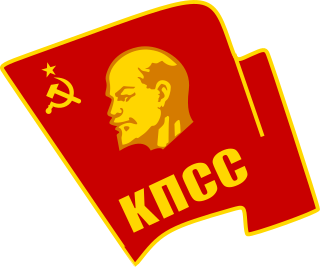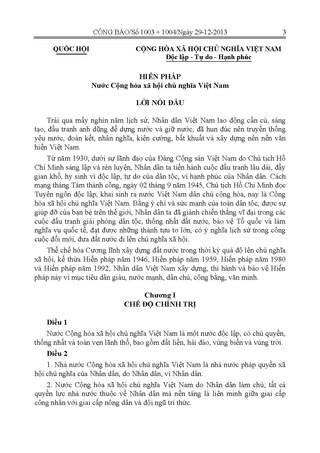
The Communist Party of the Soviet Union (CPSU), at some points known as the Russian Communist Party (Bolsheviks) and All-Union Communist Party (Bolsheviks), sometimes referred to as the Soviet Communist Party (SCP), and formerly known as the Bolshevik Party, was the founding and ruling political party of the Soviet Union. The CPSU was the sole governing party of the Soviet Union until 1990 when the Congress of People's Deputies modified Article 6 of the 1977 Soviet Constitution, which had previously granted the CPSU a monopoly over the political system. The party's main ideology was Marxism-Leninism.
A communist party is a political party that seeks to realize the socio-economic goals of communism. The term "communist party" was popularized by the title of The Manifesto of the Communist Party (1848) by Karl Marx and Friedrich Engels. As a vanguard party, the communist party guides the political education and development of the working class (proletariat). As a ruling party, the communist party exercises power through the dictatorship of the proletariat. Vladimir Lenin developed the idea of the communist party as the revolutionary vanguard, when the socialist movement in Imperial Russia was divided into ideologically opposed factions, the Bolshevik faction and the Menshevik faction. To be politically effective, Lenin proposed a small vanguard party managed with democratic centralism which allowed the centralized command of a disciplined cadre of professional revolutionaries. Once a policy was agreed upon, realizing political goals required every Bolshevik's total commitment to the agreed-upon policy.

Human rights in the Soviet Union were severely limited. The Soviet Union was a totalitarian state from 1927 until 1953 and a one-party state until 1990. Freedom of speech was suppressed and dissent was punished. Independent political activities were not tolerated, whether they involved participation in free labor unions, private corporations, independent churches or opposition political parties. The citizens' freedom of movement was limited both inside and outside the country.
A communist state is a form of government that combines the state leadership of a communist party, Marxist–Leninist political philosophy, and an official commitment to the construction of a communist society. Communism in its modern form grew out of the socialist movement in 19th-century Europe and blamed capitalism for societal miseries. In the 20th century, several communist states were established, first in Russia with the Russian Revolution of 1917 and then in portions of Eastern Europe, Asia, and a few other regions after World War II. The institutions of these states were heavily influenced by the writings of Karl Marx, Friedrich Engels, Vladimir Lenin, Joseph Stalin and others. During most of the 20th century, around one-third of the world's population lived in communist states. However, the political reforms of Soviet leader Mikhail Gorbachev known as Perestroika and socio-economic difficulties produced the revolutions of 1989, which brought down all the communist states of the Eastern Bloc bar the Soviet Union. The repercussions of the collapse of these states contributed to political transformations in the Soviet Union and Yugoslavia and several other non-European communist states. Presently, there are five communist states in the world: China, Cuba, Laos, North Korea and Vietnam.
The 1936 Constitution of the Soviet Union, also known as the Stalin Constitution, was the constitution of the Soviet Union adopted on 5 December 1936.
The 1977 Constitution of the Soviet Union, officially the Constitution of the Union of Soviet Socialist Republics, was the constitution of the Soviet Union adopted on 7 October 1977.

The Vietnamese Constitution or the Constitution of Vietnam, fully the Constitution of the Socialist Republic of Vietnam, is the fundamental and supreme law of the Socialist Republic of Vietnam. The current constitution was adopted on November 28, 2013, by the Thirteenth National Assembly, and took effect on January 1, 2014, being the third constitutions adopted by the Vietnamese state since the political reunification of the country in 1976.

The political system of the Soviet Union took place in a federal single-party soviet socialist republic framework which was characterized by the superior role of the Communist Party of the Soviet Union (CPSU), the only party permitted by the Constitution.

Demokratizatsiya was a slogan introduced by Soviet Communist Party General Secretary Mikhail Gorbachev in January 1987 calling for the infusion of "democratic" elements into the Soviet Union's single-party government. Gorbachev's Demokratizatsiya meant the introduction of multi-candidate—though not multiparty—elections for local Communist Party (CPSU) officials and Soviets. In this way, he hoped to rejuvenate the party with progressive personnel who would carry out his institutional and policy reforms. The CPSU would retain sole custody of the ballot box.

Before the perestroika Soviet era reforms of Gorbachev that promoted Eurocommunism, the majority of its history it went the formal ideology of the Communist Party of the Soviet Union (CPSU) was Marxism–Leninism, a form of socialism consisting of a centralised command economy with a vanguardist one-party state that aimed to realize the dictatorship of the proletariat. The Soviet Union's ideological commitment to achieving communism included the national communist development of socialism in one country and peaceful coexistence with capitalist countries while engaging in anti-imperialism to defend the international proletariat, combat the predominant prevailing global system of capitalism and promote the goals of Russian Communism. The state ideology of the Soviet Union—and thus Marxism–Leninism—derived and developed from the theories, policies and political praxis of Marx, Engels, Lenin and Stalin.

The electoral system of the Soviet Union was varying over time, being based upon Chapter XIII of the provisional Fundamental Law of 1922, articles 9 and 10 of the 1924 Constitution and Chapter XI of the 1936 Constitution, with the electoral laws enacted in conformity with those. The Constitution and laws applied to elections in all Soviets, from the Supreme Soviet of the Soviet Union, the Union republics and autonomous republics, through to regions, districts and towns. Voting was claimed to be secret and direct with universal suffrage. However, in practice, before 1989, voters could vote against candidates preselected by the Communist Party only by spoiling their ballots, whereas votes for the party candidates could be cast simply by submitting a blank ballot. A person would be given a ballot by a clerk, and could immediately walk to the ballot box, and while there were booths in which one could strike the candidates they voted against off the ballot, this was easy to record and was not commonly done by voters.

The Government of the Union of Soviet Socialist Republics (USSR) was the executive and administrative organ of the highest body of state authority, the All-Union Supreme Soviet. It was formed on 30 December 1922 and abolished on 26 December 1991. The government was headed by a chairman, most commonly referred to as the premier of the Soviet Union, and several deputy chairmen throughout its existence. The Communist Party of the Soviet Union (CPSU), as "The leading and guiding force of Soviet society and the nucleus of its political system" per Article 6 of the state constitution, controlled the government by holding a two-thirds majority in the All-Union Supreme Soviet. The government underwent several name changes throughout its history, and was known as the Council of People's Commissars from 1922 to 1946, the Council of Ministers from 1946 to 1991, the Cabinet of Ministers from January to August 1991 and the Committee on the Operational Management of the National Economy from August to December 1991.

The Congress of People's Deputies of the Soviet Union was the highest body of state authority of the Soviet Union from 1989 to 1991.
The Ukrainian Soviet Socialist Republic, part of the Soviet Union, had four successive constitutions during its existence. The first (1919) was in Russian and the final three were in Ukrainian.

The Constitution of Uzbekistan of 1978 was adopted on 19 April 1978 at the extraordinary session of the Supreme Soviet of Uzbekistan. The Constitution of Uzbekistan of 1978 contains 11 parts and it is further divided into 21 chapters.
In Marxist philosophy, the dictatorship of the proletariat is a condition in which the proletariat holds state power. The dictatorship of the proletariat is the intermediate stage between a capitalist economy and a communist economy, whereby the post-revolutionary state seizes the means of production, compels the implementation of direct elections on behalf of and within the confines of the ruling proletarian state party, and institutes elected delegates into representative workers' councils that nationalise ownership of the means of production from private to collective ownership. During this phase, the administrative organizational structure of the party is to be largely determined by the need for it to govern firmly and wield state power to prevent counterrevolution and to facilitate the transition to a lasting communist society.
Vanguardism, in the context of Leninist revolutionary struggle, relates to a strategy whereby the most class-conscious and politically "advanced" sections of the proletariat or working class, described as the revolutionary vanguard, form organizations to advance the objectives of communism. They take actions to draw larger sections of the working class toward revolutionary politics and to serve as manifestations of proletarian political power opposed to the bourgeoisie. This theory serves as the underpinning of the leading role of the Communist party, usually enshrined in the constitution, after the seizure of power in the state by Communists.

Democratic centralism is the organisational principle of socialist states and of most communist parties. In practice, democratic centralism means that political decisions reached by voting processes are binding upon all members of the political party. It is mainly associated with Leninism, wherein the party's political vanguard of revolutionaries practice democratic centralism to select leaders and officers, determine policy, and execute it.
A socialist state, socialist republic, or socialist country, sometimes referred to as a workers' state or workers' republic, is a sovereign state constitutionally dedicated to the establishment of socialism. The term communist state is often used synonymously in the West, specifically when referring to one-party socialist states governed by Marxist–Leninist communist parties, despite these countries being officially socialist states in the process of building socialism and progressing toward a communist society. These countries never describe themselves as communist nor as having implemented a communist society. Additionally, a number of countries that are multi-party capitalist states make references to socialism in their constitutions, in most cases alluding to the building of a socialist society, naming socialism, claiming to be a socialist state, or including the term people's republic or socialist republic in their country's full name, although this does not necessarily reflect the structure and development paths of these countries' political and economic systems. Currently, these countries include Algeria, Bangladesh, Guyana, India, Nepal, Nicaragua, Sri Lanka and Tanzania.






